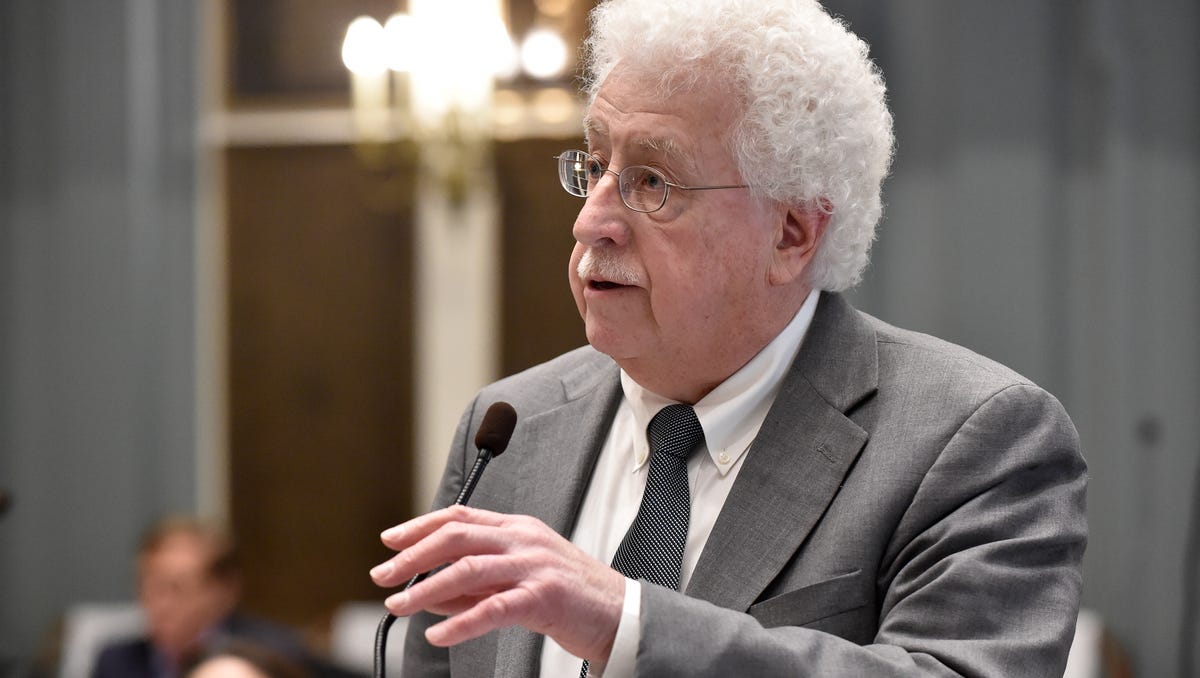California
Federal prison worker gets 8 years for abusing female inmates; investigation ongoing

A former federal correctional officer was sentenced to eight years in prison Thursday for sexually abusing women inmates in California — the latest case to focus on sex abuse in the nation’s prisons.
Andrew Jones, 36, of Clovis, California, pleaded guilty on Aug. 17 to six counts of sexual abuse involving three inmates at the Federal Correctional Institution at Dublin, California, and one count of lying to the justice department’s inspector general, U.S. Department of Justice officials said in a release. He was sentenced to 96 months in prison.
Jones was also ordered to serve ten years of supervised release after his prison term, justice officials said. He is expected back in court on Feb. 8 for a restitution hearing.
The latest sentencing of a federal prison worker comes amid increasing pressure in recent years to address rampant sexual abuse of incarcerated people, with congressional reports and watchdog studies accusing U.S. officials of ignoring the problem.
According to a recent senate investigation, women prisoners are more susceptible to abuse, with sexual abuse from employees reported in at least two-thirds of all federal facilities in the last decade. Sexual contact between federal prison employees and inmates is a federal crime and is also prohibited under the bureau’s policy.
‘A systemic issue’: Inmates at Northern California women’s prison sue federal government over sexual abuse
“The egregious sexual abuse that took place at FCI Dublin was disgraceful and tragic, and the Justice Department will not rest until we have eliminated such misconduct from the Federal Bureau of Prisons,” said Deputy Attorney General Lisa O. Monaco in a statement. “As the defendant’s guilty plea and today’s sentencing demonstrate, FBOP employees who abuse their positions of authority and assault those in their custody will be held to account.”
The prison is still under investigation, according to the U.S. Attorney’s Office. Jones is one of eight officers at FCI Dublin charged with sexual misconduct in the last three years, prosecutors said.
“The Federal Bureau of Prisons strongly condemns all forms of sexually abusive behavior and takes seriously our duty to protect the individuals entrusted in our custody,” a spokesperson told USA Today in an email. “The FBOP has taken assertive action at FCI Dublin to make changes regarding safety and communication. While this work is not complete, it is a serious and ongoing effort.”
Correctional officer enforced ‘silence and obedience’
Jones was a correctional officer at FCI Dublin in Alameda County and supervised inmates working in the food services department, prosecutors said. The all-women minimum-security prison houses 714 inmates.
Officials said Jones admitted that between July 2020 and June 2021, while he had supervisory and disciplinary authority over the women inmates, he received oral sex or had sexual intercourse with three inmates who worked for him in the facility’s kitchen. Authorities said the abuse occurred in places like a staff bathroom, a warehouse, and a room where utensils were kept.
Prosecutors said Jones “enforced silence and obedience” from inmates by using “violence and threats of violence.”
“Intimidation and insults on the one hand, and the flattery on the other, was aimed at cultivating pliant prisoners who Jones could abuse for his own sexual pleasure, while he remained safe in the belief that his misconduct would go unreported,” prosecutors said in a sentencing memorandum.
Prosecutors: ‘This investigation is not over’
Prosecutors said seven other correctional officers at FCI Dublin have been charged with federal crimes involving sexual misconduct in the last three years. Jones is the fourth to be sentenced.
Inspector General Michael E. Horowitz said in a statement that Jones, the warden, the chaplain and other facility employees “participated in a culture of sexual abuse of female inmates.”
As of May 2022, officials said at least 17 current or former employees at FCI Dublin are being investigated for sexual misconduct. The prison has had at least three high-profile cases of sexual abuse of women prisoners.
A senate report released in late 2022 details some of the FCI Dublin employees charged in recent years.
In June 2021, Ross Klinger, a former correctional officer, pleaded guilty to three counts of sexual abuse of a ward.
In November that year, officer John Bellhouse was accused of abuse of a prison ward. Officials said Bellhouse engaged in sexual interactions with several inmates and provided them with contraband, money and personal cell phone use.
That same month, Ray J. Garcia, the former Warden of FCI Dublin, was indicted on two counts of sexual abuse of a ward for knowingly having sexual contact with at least one woman inmate and for asking at least two of them to strip during rounds as he took photos. He was convicted by a jury in December 2022.
James Highhouse, a former Chaplain at FCI Dublin, in August 2022 was sentenced to 84 months in prison followed by five years of supervised release for charges of sexual abuse of a ward, abusive sexual contact, and making false statements to investigators.
On Oct. 27, 2022, Enrique Chavez, a food service foreman at FCI Dublin, pleaded guilty to two counts of abusive sexual contact with a woman inmate.
“This ongoing investigation has unearthed evidence regarding the criminal activities of numerous employees at the Federal Correctional Institution at Dublin,” said U.S. Attorney for the Northern District of California Ismail Ramsey in a statement. “To be clear, this investigation is not over – correctional officers at FCI Dublin are trusted to secure the safety of inmates at the institution; the Department of Justice will continue to hold accountable any correctional officer who violates that solemn responsibility.”
Donald Murphy, U.S. Bureau of Prisons spokesperson, told USA Today that senior subject matter experts across all disciplines were sent to the facility to assess short-term and long-term needs. Psychological and religious resources have been offered to women in custody.
Murphy said the bureau has a contract with an external consulting firm experienced in best practices in facilities serving women in the justice system. He said the firm is training all facility staff to promote safety, communication, boundaries and trauma-informed care.
“We are fully committed to gaining the confidence of the public, the individuals in our care and custody, and the employees at FCI Dublin,” Murphy said in an email. “Our work is grounded in the expectation that changes at the facility are focused on safety and create strong accountability at every level of the organization.”
Special report: Prison, jail staff rarely face legal consequences after sex abuse of inmates
Sexual abuse in federal prisons across the country
Sexual abuse of adult inmates is an ongoing problem in U.S. jails and prisons, with thousands of victims of inmate-on-inmate abuse and staff-on-inmate abuse reported during 2016 through 2018, according to a special report by the U.S. Department of Justice released earlier this year.
According to the senate investigations report, four facilities in New York, Florida and California with woman inmates had recurring cases of sexual abuse from male employees between 2012 and 2022. FCI Dublin was among the prisons listed.
In October, a former Oregon Department of Corrections nurse was sentenced to 30 years in federal prison for sexually assaulting nine woman inmates while working at a correctional facility.

California
Strings attached to bills Newsom signed on antisemitism, AI transparency and other major California policies

SACRAMENTO — Though hailed by some for signing new laws to combat antisemitism in California schools, Gov. Gavin Newsom expressed enough reservations about the bills to urge state lawmakers to make some changes.
Supporters of the legislation, Senate Bill 48 and Assembly Bill 715, said it was needed to protect Jewish students on campus, while opponents argued it was broadly written and would stifle free speech and classroom discussions about current events in the Middle East, including the Israel-Hamas war.
Newsom, when he signed the bills, directed legislators to work quickly on a follow-up measure to address “urgent concerns about unintended consequences.”
The governor made similar requests for nearly a dozen other major bills he signed into law this year, including measures providing safeguards on artificial intelligence, protections for children online and banning law enforcement officers donning masks — a direct response to federal agents hiding their identities during immigration raids across the state.
Newsom’s addendums provide a glimpse into the sometimes flawed or incomplete process of crafting new laws, at times hastily at the end of legislative session, requiring flaws or unresolved conflicts to be remedied later.
San Jose State University professor emeritus and political analyst Larry Gerston said governors sometimes go this route when, despite having concerns, they feel the legislation is too urgent to veto.
“I think you are looking at a situation where he thought the issue was sufficiently important and needed to go ahead and get it moving,” he said.
Gerston, however, noted those with a cynical view of politics could argue governors use this tactic as a way to undo or water down legislation that — for various political reasons — they wanted to pass in the moment.
“Depending upon your attitude toward the governor, politics and legislation, [that viewpoint] could be right or wrong,” he said.
One of the authors of the antisemitism bills, Assemblymember Rick Chavez Zbur (D-Los Angeles), said he will put forth another measure next year and continue working with educational organizations and the California Legislative Jewish Caucus to ensure the right balance is struck.
“The assertions that the bill is intended to prevent instruction about controversial topics, including topics related to Israel, is just not accurate,” said Zbur, who introduced AB 715. “We will be making sure that it’s clear that instruction on complicated issues, on controversial issues, that critical education can continue to take place.”
Zbur said he will reexamine a provision requiring the “factual accuracy” of instructional materials.
“One of the things that we’ve agreed to do was focus on making sure that the bill continues to meet its goal, but revisit that factually accurate language to make sure that, for example, you can continue to teach [works of] fiction in the classroom,” he said.
Another new law flagged by Newsom bans local and federal agents from wearing masks or facial coverings during operations.
The governor approved Senate Bill 627 — carried by Sens. Scott Wiener (D-San Francisco) and Jesse Arreguín (D-Berkeley) — last month as a response to the Trump administration’s aggressive immigration raids that are often conducted by masked agents in unmarked cars. Newsom said it was unacceptable for “secret police” to grab people off the streets.
“This bill establishes important transparency and public accountability measures to protect public safety, but it requires follow-up legislation,” Newsom wrote in his signing statement. “Given the importance of the issue, the legislature must craft a bill that prevents unnecessary masking without compromising law enforcement operations.”
Newsom said clarifications about safety gear and additional exemptions for legitimate law enforcement activities were needed.
“I read this bill as permitting the use of motorcycle or other safety helmets, sunglasses, or other standard law enforcement gear not designed or used for the purpose of hiding anyone’s identity, but the follow-up legislation must also remove any uncertainty or ambiguities,” he wrote.
Wiener agreed to revisit the measure.
“I’m committed to working with the Governor’s office to further refine SB 627 early next year to ensure it is as workable as possible for many law enforcement officers working in good faith,” he said.
California is the first state to ban masking for federal law enforcement and the law will likely be challenged in court. The move drew ire from U.S. Department of Homeland Security Secretary Kristi Noem, who called the legislation “despicable” and said forcing officers to reveal their faces increases their risk of being targeted by criminals.
Newsom is also urging legislators to adjust two new tech-related laws from Assemblymember Buffy Wicks (D-Oakland).
Assembly Bill 853, dubbed the California AI Transparency Act, is intended to help people identify content created by artificial intelligence. It requires large online platforms, such as social media sites, to provide accessible provenance data on uploaded content starting in 2027. Provenance data is information about the origin and modification history of online content.
In his signing statement, Newsom called the legislation a “critical step” but said it could interfere with privacy.
“Some stakeholders remain concerned that provisions of the bill, while well-intentioned, present implementation challenges that could lead to unintended consequences, including impairment of user privacy,” he wrote. “I encourage the legislature to enact follow up legislation in 2026, before the law takes effect, to address these technical feasibility issues.”
Assembly Bill 1043 aims to help prevent children from viewing inappropriate content online. It directs operating system providers to allow parents to input their children’s ages when setting up equipment such as laptops or smartphones, and then requires users to be grouped in different age brackets. It gained approval from tech companies including Meta and Google while others raised concerns.
“Streaming services and video game developers contend that this bill’s framework, while well-suited to traditional software applications, does not fit their respective products,” Newsom wrote in his signing statement. “Many of these companies have existing age verification systems in place, addressing complexities such as multi-user accounts shared by a family and user profiles utilized across multiple devices.”
The governor urged lawmakers to address those concerns before the law is set to take effect in 2027.
Wicks was unavailable for comment.
California
Vote centers for California’s special election on redistricting open this weekend

Want to cast your ballot in person? Need a replacement ballot or help registering to vote?
You’re in luck: The first batch of vote centers open for California’s special election on redistricting on Saturday, Oct. 25.
Vote centers offer a range of services. They are places for people to return their ballots in person, rather than by mail or at a drop box. But voters can also find help for their voting-related issues, obtain a replacement ballot, or register to vote and cast a provisional ballot.
Southern California’s guide to Prop. 50, the 2025 redistricting election
Many vote centers open this weekend; another set of vote centers open on Saturday, Nov. 1. Check your county elections offices for specific locations and hours of operation.
On Election Day, Nov. 4, vote centers will be open from 7 a.m. to 8 p.m. (Remember, if you’re in line to vote at 8 p.m., you can stay in line and still vote.)
Keep in mind, not every county conducts elections under California’s Voter’s Choice Act, which expands early, in-person voting and utilizes vote centers as options for voters.
In Southern California, Los Angeles, Orange and Riverside counties operate under this model, as well as San Diego and Ventura counties.
San Bernardino County conducts elections using the traditional polling place model, though it does offer early voting sites available for residents. And with the use of electronic poll pads for voter check-in, said spokesperson David Wert, registered voters can cast their ballot at any polling place in the county.
You can find the nearest early voting or drop-off location through the California secretary of state’s website at www.caearlyvoting.sos.ca.gov. Simply input your county — you can also narrow your search by adding your city or ZIP code — and view nearby results in a list or on a map.
And aside from vote centers, secure drop boxes are also available for voters to cast a ballot.
Ballots, which were mailed to every registered voter at the beginning of October, can also be returned via U.S. Postal Service. They come with prepaid postage and return envelopes, and must be postmarked on or before Election Day, and arrive to county elections offices no later than seven days after Nov. 4, to be counted.
Find more information at your county elections office:
• L.A. County: www.lavote.gov/home/voting-elections
• Orange County: www.ocvote.gov
• Riverside County: www.voteinfo.net
• San Bernardino County: www.elections.sbcounty.gov
Staff writer Jeff Horseman contributed to this report.
California
FBI agent posing as 12-year-old girl ensnares alleged pedophile in California

A 41-year-old Ventura man is facing the possibility of life in prison after he sent a federal agent posing as both a dad and a daughter sexually explicit photos, authorities announced earlier this week.
Trevor Lyons began speaking to the undercover agent with the Federal Bureau of Investigation in August 2024 on the Kik messaging app. At the time, the agent was posing as the father of a 12-year-old girl who used the name “UC Dad,” the L.A. Times reported.
According to the indictment, Lyons responded, “Oooof. A tad young but do you have pics?” when the undercover officer gave him the age of his fictitious daughter.
Federal officials also said Lyons told UC Dad that he wanted to talk to the young girl, saying, “I’d love to see how much of a freak she is.”
The 41-year-old then offered photos of his own 17-year-old daughter from when she was 15 years old and continued to have sexually explicit conversations with UC Dad that month on Telegram.
In September 2024, Lyons added what he thought was UC Dad’s 12-year-old girl as a friend on Discord, telling her that he was 40 and asking if she had ever seen a penis before, the indictment details. As the conversations continued to escalate, investigators say he asked UC Dad’s daughter if she had ever performed oral sex and offered to teach her how before sending an explicit photo and video with a request that she perform it on him.
Law enforcement seized various electronics from Lyons in December 2024, including an iPhone 16, an iPad and a Samsung Galaxy flip phone.
In the indictment, filed in August this year, investigators allege Lyons had a yearslong history of distributing child pornography along with accusations that in May 2020, he coerced a minor to engage in sexually explicit acts for photographs that would be distributed as child sexual abuse materials.
The 41-year-old, according to federal investigators, went by several usernames online, including Defi Samurai, Carly and Herbdoc.
He was arrested Oct. 20 after a federal grand jury charged him in a nine-count felony indictment with sexual exploitation, attempted sexual exploitation of a child for the purpose of producing sexually explicit visual depiction, attempted enticement of a minor to engage in criminal sexual activity and distribution of child pornography, according to the FBI.
“If convicted on all charges, Lyons faces a statutory maximum sentence of life in prison,” federal officials said.
-

 New York3 days ago
New York3 days agoVideo: How Mamdani Has Evolved in the Mayoral Race
-

 World6 days ago
World6 days agoIsrael continues deadly Gaza truce breaches as US seeks to strengthen deal
-

 News5 days ago
News5 days agoVideo: Federal Agents Detain Man During New York City Raid
-

 News5 days ago
News5 days agoBooks about race and gender to be returned to school libraries on some military bases
-

 Technology6 days ago
Technology6 days agoAI girlfriend apps leak millions of private chats
-

 Politics6 days ago
Politics6 days agoTrump admin on pace to shatter deportation record by end of first year: ‘Just the beginning’
-

 News6 days ago
News6 days agoTrump news at a glance: president can send national guard to Portland, for now
-

 Business6 days ago
Business6 days agoUnionized baristas want Olympics to drop Starbucks as its ‘official coffee partner’



















